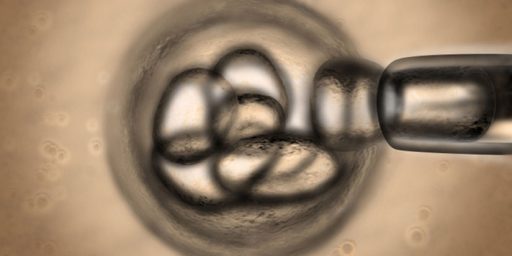Stem Cell Advances May Make Moral Issue Moot
Scientists are apparently quite close to creating research quality stem cells without having to harvest them from human embryoes.
Stem Cell Advances May Make Moral Issue Moot (WaPo, A7)
If only human embryonic stem cells could sprout anew from something other than a human embryo. Researchers could harvest them and perhaps harness their great biomedical potential without destroying what some consider to be a budding human life. But like a low-calorie banana split or the proverbial free lunch, there is no such thing as an embryo-free embryonic stem cell.
Or is there?
In recent months, a number of researchers have begun to assemble intriguing evidence that it is possible to generate embryonic stem cells without having to create or destroy new human embryos. The research is still young and largely unpublished, and in some cases it is limited to animal cells. Scientists doing the work also emphasize their desire to have continued access to human embryos for now. It is largely by analyzing how nature makes stem cells, deep inside days-old embryos, that these researchers are learning how to make the cells themselves.
Yet the gathering consensus among biologists is that embryonic stem cells are made, not born — and that embryos are not an essential ingredient. That means that today’s heated debates over embryo rights could fade in the aftermath of technical advances allowing scientists to convert ordinary cells into embryonic stem cells. “That would really get around all the moral and ethical concerns,” said James F. Battey, chief of the stem cell task force at the National Institutes of Health. The techniques under study qualify for federal grant support because embryos are not harmed, he noted. And eventually the work could boost the number of stem cell colonies, or lines, available for study by taxpayer-supported researchers.
This would be an ideal outcome. Being able to explore the touted possibilities from stem cell research without having to first destroy human life would indeed untie that particular Gordian knot.



But, will those who have taken up the cause of selling stem cells like the 21st century equivalent of snake oil ever apologise once it is discovered that they can’t cure everything under the sun?
They will have nothing to apologize for. They see a potential life-saving technology and want to explore it. That’s what scientists do.